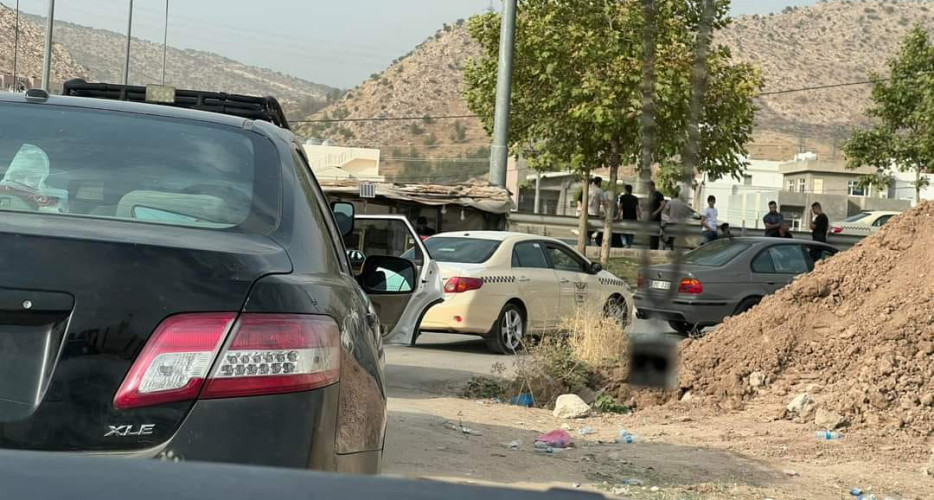
Peregraf- Ammar Aziz
Every morning when he begins his day as a taxi driver, Mohammed Maaz spends at least three hours in line waiting for gasoline.
"Our whole life spent in a queue," Maaz told Peregraf, explaining that there are widespread shortages of affordable fuel in Duhok. The governorate produces most of the crude oil pumped in the Kurdistan Region, but residents "have to wait for hours every day to receive just 40 liters of gasoline."
Government-subsidized gasoline, which is what people line up for, costs 750 Iraqi dinars ($0.58) per liter, while commercially available gasoline costs between 1,200 Iraqi dinars ($0.92) and 1,500 Iraqi dinars ($1.15) per liter depending on the grade. While these prices are low by international standards, average income in the Kurdistan Region is less than $500 per month.
"As far as I remember, we have always had a shortage of gasoline. I don't know when we will get rid of it," Maaz said. He believes that the government should set up subsidized gas stations specifically for taxi drivers.
"If we have to line up every day, what time will we have for work?" he added.
Prices at commercial gas station have increased over the past month, which has driven more people into line at the subsidized stations.
Majid Sayed Salih, deputy governor for technical affairs, told Peregraf that Duhok receives a smaller share of gasoline, propane, and heating oil than Sulaimaniyah and Erbil.
While its population is smaller than the other two governorates, it also has a larger relative share of refugees and internally displaced persons (IDPs). There are at least 367,000 displaced persons living in Duhok and they also use fuel, but do not appear to count towards the population-based quota for fuel distribution.
"The number of refugees is not taken into account in terms of the supply of gasoline, oil, and propane. They buy gasoline and gas in Duhok and this creates more congestion and pressure on gas stations and gas supply points," Sayed Salih said.
"The provincial government has officially requested an increase in the fuel quota, but has not received a positive response. We will continue our efforts to reduce the pressure on fuel" he added.
Duhok needs 1.7 million liters of gasoline per day of subsidized gasoline from the Kurdistan Regional Government’s (KRG) Ministry of Natural Resources (MNR) to meet demand, but only receives between 250,000 and 300,000 liters each day.
Abdul Samad Telly, chairman of the Energy and Natural Resources Committee on the Duhok Provincial Council, told Peregraf that "the ministry is responsible for determining the share of the provinces in fuel. The decision is up to them."
Samad Telly said that supply levels are inconsistent in Duhok and Zakho.
It is "five tankers one day, six tankers another day, and nine tankers another day. Each tanker is 36,000 liters," he said. The governorate has 190,000 vehicles, including 17,000 taxis, 800 minibuses, and 1,000 buses.
Erbil has 16 gas stations that distribute subsidized fuel from MNR, but there are just six across Duhok.
Mahmoud Sulaiman, president of the transport union in Duhok, told Peregraf that minibus and taxi drivers complain that there is not enough subsidized gasoline for them. As a temporary solution, one gas station has been designated for fueling up buses and minibuses with the cheap gas, but no accommodations have been made for taxis drivers.
"The relevant parties say they do not know why the gasoline quota in Duhok is low," said Sulaiman.
The problems and costs of gassing up in Duhok stand in stark contrast to its role as a major producer of crude oil. The majority of the Kurdistan Region’s production occurs in Duhok.
Moreover, gasoline costs just 450 Iraqi dinars ($0.35) per liter next door in Nineveh governorate, where Iraq’s federal government is in charge of providing subsidies for fuel.
Sulaiman demanded that the Kurdistan Parliament address the issue, since it ostensibly has oversight of MNR. However, the legislature dissolved several months ago. While new elections are scheduled for February, it is unclear whether they will take place at that time or how long it might to form a government.
"There are certainly differences between the governorates and Duhok gets less than the others," he said.